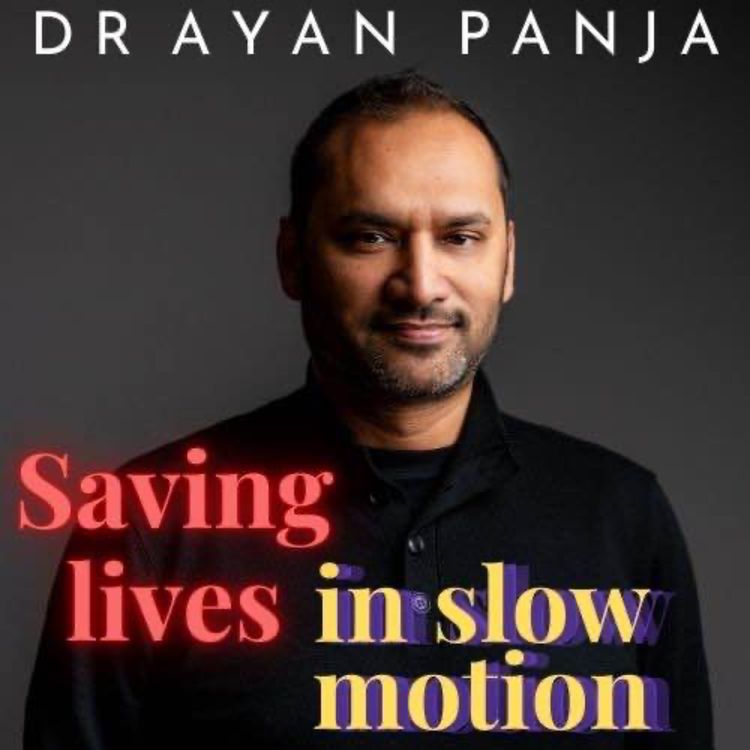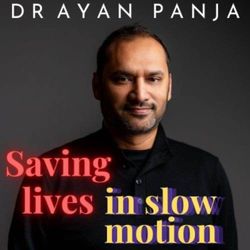Share

Saving Lives In Slow Motion
Genetics, epigenetics and inherited diseases
Season 1, Ep. 95
•
In this episode I look at the role of our genes in health and illness.
Patterns of inherited diseases: https://www.verywellhealth.com/how-genetic-disorders-are-inherited-2860737
Epigenetics explained: https://www.theguardian.com/science/occams-corner/2014/apr/25/epigenetics-beginners-guide-to-everything
Epigenetics and inheritance: https://learn.genetics.utah.edu/content/epigenetics/inheritance
Ethics of medical genetic testing: https://pubmed.ncbi.nlm.nih.gov/24300652/
CRISPR technology: https://frontlinegenomics.com/unlocking-the-future-where-is-gene-editing-going-next/
Save your life in slow motion and those of others by subscribing now and sharing. Thank you for listening and for your support. It means a lot to me.
More episodes
View all episodes

204. Second Opinions: why people seek them, the risks and the benefits
15:47||Season 1, Ep. 204Second opinions are an increasingly common request in healthcare and in this episode I look at reasons why people seek them and their pros and cons Links:Martha’s rule: https://www.england.nhs.uk/patient-safety/marthas-rule/Hyponatraemia (low sodium): https://www.mayoclinic.org/diseases-conditions/hyponatremia/symptoms-causes/syc-20373711Advice on second opinions: https://www.patients-association.org.uk/getting-a-second-opinionTumour Treating Fields: https://www.cancer.org/cancer/managing-cancer/treatment-types/tumor-treating-fields.htmlLithium and MND doesn’t work?: https://www.kcl.ac.uk/archive/news/ioppn/records/2013/march/lithium-shows-no-benefit-to-mnd-patientsLithium and MND works?: https://www.ucl.ac.uk/centre-for-neuromuscular-diseases/research/experimental-clinical-trials/mnd/motor-neurone-disease-closed-trials/licals-therapeutic
203. Invisible Habits that can sabotage our health - some reflections
15:14||Season 1, Ep. 203In this episode I look at things that can hamper our health journey by looking at our own life in an easy and compassionate way.Links:The Health Fix on Kindle offer January 2026: https://www.amazon.co.uk/Health-Fix-Dr-Ayan-Panja-ebook/dp/B0B2VTFFVS/ref=tmm_kin_swatch_0Sleep and its importance: https://pmc.ncbi.nlm.nih.gov/articles/PMC6281147/Phone and screen usage: https://pmc.ncbi.nlm.nih.gov/articles/PMC11236742/Decluttering: https://drayanpanja.substack.com/p/decluttering-your-home-how-it-could-1fd\\Exercise: https://www.sciencefocus.com/wellbeing/exercise-snacksImpulsivity: https://www.healthline.com/health/mental-health/impulsive-behavior#Impulsive-behavior-meaningOverwhelm: https://www.bbc.co.uk/sounds/play/m002pf4w
202. 2026 - the year of discernment and choices
14:35||Season 1, Ep. 202It’s a new year and that can feel overwhelming.In this episode I look at what the year is likely to bring in terms of health and medical trends, our own personal goals and how to generate ideas for them if you are feeling a bit stuck.Links: The Health Fix: https://www.amazon.co.uk/Health-Fix-Dr-Ayan-Panja-ebook/dp/B0B2VTFFVSMed tech in 2026: https://www.forbes.com/sites/bernardmarr/2025/10/27/the-8-biggest-healthcare-technology-trends-to-watch-in-2026/Misinformation - how to spot it: https://news.cancerresearchuk.org/2024/02/16/sorting-fact-from-fiction-a-guide-to-spotting-health-misinformation/
201. Christmas time reflection 2025
11:45||Season 1, Ep. 201Links:AI in medicine: https://www.england.nhs.uk/long-read/guidance-on-the-use-of-ai-enabled-ambient-scribing-products-in-health-and-care-settings/Various wearables: https://uk.wellnesspulse.com/lp/best-fitness-trackers/?campaignId=23304304009&adgroupId=&adId=&targetId=&device=c&gunique=CjwKCAiAmKnKBhBrEiwAaqAnZ4MBo1x_tOV7RB1FPjSEqiYWae8AyeixJJsGEVTlbapiaEWJL7D8cBoCYs8QAvD_BwE&gad_source=1&gad_campaignid=23300097782&gbraid=0AAAAAqKJRpkXwMKHsYb3EhuFeRzIdPUV2Health Check on BBC World Service: https://www.bbc.co.uk/sounds/play/w3ct6vk0Elinzanetant for menopause: https://www.gov.uk/government/news/mhra-approves-elinzanetant-to-treat-moderate-to-severe-vasomotor-symptoms-hot-flushes-caused-by-menopauseThe new weight loss drugs (GLP-1 agonists): https://my.clevelandclinic.org/health/treatments/13901-glp-1-agonistsExperimental Alzheimer’s Drug: https://www.sciencedaily.com/releases/2025/12/251222080119.htm
200. Episode 200: reflections, precision medicine and the one thing we should all be doing.
15:50||Season 1, Ep. 200This is my 200th episode and I reflect on where medicine is at in terms of precision medicine and what it means for us.Links:Please take this 10 minute survey to help keep this podcast going: http://bit.ly/savinglivesinslowmotion-surveyGenome sequencing: https://www.genomicsengland.co.uk/blog/what-happens-when-i-go-for-whole-genome-sequencingMepan Syndrome: https://umdf.org/mepan/Ketones in dementia: https://pmc.ncbi.nlm.nih.gov/articles/PMC8734638/London Bus study: https://cardiachealth.org.uk/the-london-busmen-study/Drumming - physical and mental therapy?: https://melodics.com/blog/mental-health-benefits-of-drumming
199. Traditional Medicine: ancient global healing knowledge in today’s world
15:52||Season 1, Ep. 199Traditional medicine has been around for thousands of years. In this episode I look at what we can learn from it and how it compares to modern allopathic medicine in its approach. Please take this 10 minute survey to help keep this podcast going: http://bit.ly/savinglivesinslowmotion-surveyLinks: WHO TCIM summit: https://www.who.int/teams/who-global-traditional-medicine-centre/global-summit-and-collaborations/second-traditional-medicine-global-summitWHO — Global strategies and WHO TCIM topic pages (authoritative overview of WHO’s stance and the Global Traditional Medicine Strategy 2025–2034). World Health Organization+1WHO feature: World Health OrganizationNIH/NCCIH pages on Ayurveda and Traditional Chinese Medicine. NCCIH+1African medicinal plants - a review: PMCPrunus africana: https://pmc.ncbi.nlm.nih.gov/articles/PMC5327751/Four sacred medicines: https://aihschgo.org/four-sacred-medicines/Ayahuasca: https://www.healthline.com/nutrition/ayahuascaIcaros: https://www.nimeakaya.org/how-icaros-help-heal-participants-in-ayahuasca-ceremonies/
198. Anti-ageing - what really works
16:35||Season 1, Ep. 198Anti-ageing means different things to different people. In this episode I look at what it means and what works to slow down the ageing process.Reactive oxygen species: https://www.ahajournals.org/doi/10.1161/circresaha.117.311401Mitochondria and ageing: https://www.nature.com/articles/s41574-021-00626-7Inflammation (inflammaging): https://www.nature.com/articles/s41574-018-0059-4Epigenetic drift: https://pmc.ncbi.nlm.nih.gov/articles/PMC12487821/Protein misaggregation: https://www.buckinstitute.org/blog/unraveling-aging-how-protein-misfolding-relates-to-aging-and-disease/Dietary patterns: https://www.medicalnewstoday.com/articles/fasting-like-diet-may-help-reverse-biological-aging-2-5-yearsGut microbes: https://www.nature.com/articles/s41575-022-00605-xRapamycin - an experimental drug for anti-ageing: https://www.thelancet.com/journals/lanhl/article/PIIS2666-7568(23)00258-1/fulltextSenolytics: https://pmc.ncbi.nlm.nih.gov/articles/PMC7405395/Stem cells: https://pmc.ncbi.nlm.nih.gov/articles/PMC10276889/NAD / NAD+: https://www.today.com/health/aging/nad-benefits-rcna180800
197. Self diagnosis - the perils and marvels of searching for health and illness
15:08||Season 1, Ep. 19780% of us go online to look up health related content. Many of us look up symptoms which is natural but how do we know we are doing it safely? Here I look at the pros and pitfalls of doing this and how to decide when to see a medical professional. Links: Peripheral neuropathy: https://www.nhs.uk/conditions/peripheral-neuropathy/Internet vs GP 2013 (me on BBC1): https://www.bbc.co.uk/programmes/p019px0xDigital triage: https://www.england.nhs.uk/long-read/digitally-enabled-triage/Trust in doctors: https://www.wsj.com/health/wellness/why-we-dont-trust-doctors-like-we-used-to-79784b56Depression questionnaire: https://patient.info/doctor/mental-health/phq-9National Back Pain pathway: https://www.southtees.nhs.uk/services/back-pain/national-low-back-and-radicular-pain-pathway/Ada Health - on of the leaders in symptom checking: https://ada.com/
196. Osteoarthritis - its scale, future treatments and prevention
14:49||Season 1, Ep. 196Osteoarthritis is a degenerative disease affecting our cartilage and joints causing pain and debility. In this episode I look at what it is, prevention strategies and the latest treatments. Please take this 10 minute survey to help keep this podcast going: http://bit.ly/savinglivesinslowmotion-surveyOA overview: https://www.healthdata.org/news-events/newsroom/news-releases/lancet-new-study-reveals-most-common-form-arthritisNeck stretches: https://www.csp.org.uk/conditions/neck-pain/video-exercises-neck-painLectins: https://www.sciencedirect.com/science/article/pii/S2405844024155028Ultra-processed foods and OA: https://pmc.ncbi.nlm.nih.gov/articles/PMC11990240/Apos Therapy (biomechanic therapy): https://www.nice.org.uk/guidance/mtg76/informationforpublicGlucosamine and chondroitin: https://www.health.harvard.edu/blog/the-latest-on-glucosaminechondroitin-supplements-2016101710391Chondrocyte implants: https://www.arthritis.org/health-wellness/treatment/joint-surgery/preplanning/the-future-of-joint-repairOmega 3: https://fjps.springeropen.com/articles/10.1186/s43094-024-00667-5